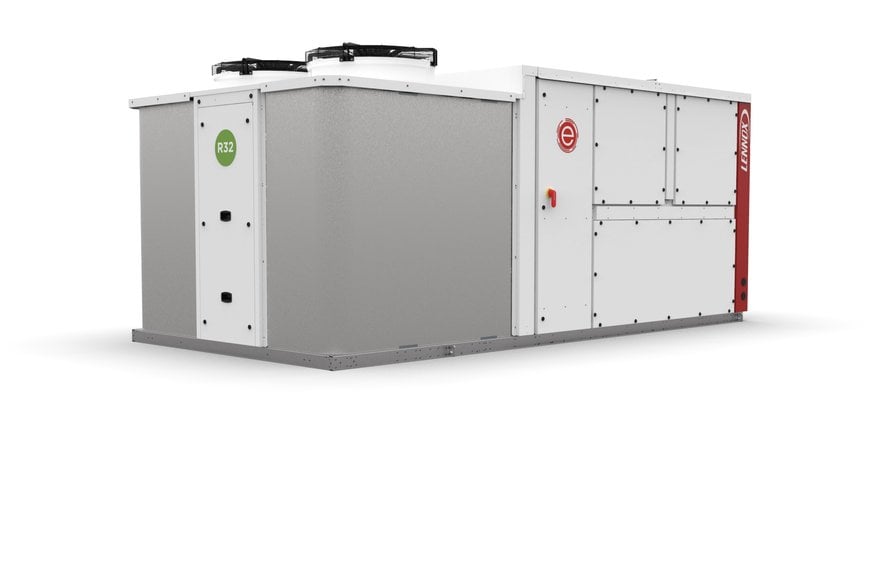www.industryemea.com
21
'20
Written on Modified on
World’s first installation of R32 rooftop units
As Lennox, air-handling specialist, is just launching the first R32 rooftop on the market, a Lidl supermarket is becoming the world’s first user of the e-Baltic units for energy-efficient delivery of hot and cold air. The advanced e-Baltic units, commissioned in January 2020, are fully compliant to the forthcoming 2021 Ecodesign regulation, and the French response to the EPBD regulations, RT2012. This world-first installation is seen as a key milestone in the industry and, moving forward, the Lennox strategy is to adopt R32 as a replacement for R410A due to its low Global Warming Potential (677 versus 1924) and its affordability.

Energy-efficient rooftop units
One of Lidl’s ambition is to be able to produce more energy through their stores than they actually consume. To achieve this ambition, one of the aspects to consider is to reduce energy consumption.
One of the reasons why Lidl selected the Lennox e-Baltic rooftop was to meet the building's ‘bbio’ requirements. Bbio (bioclimatic indicator), one of the three requirements of RT2012, is an index of good bioclimatic building design. This important measure takes into account heating, cooling and lighting needs, but is completely independent of the selected heating or cooling solution.
Designed as a high-efficiency product, the e-Baltic emphasizes highly innovative components: low-consumption electronically commutated motor fans; freewheel fan technology; newly designed piping; CO2 sensors; as well as a new generation of heat exchangers.
The e-Baltic’s features enable the unit to adjust its power and airflow according to real climatic conditions; and thus, generate significant energy savings.
One of the reasons why Lidl selected the Lennox e-Baltic rooftop was to meet the building's ‘bbio’ requirements. Bbio (bioclimatic indicator), one of the three requirements of RT2012, is an index of good bioclimatic building design. This important measure takes into account heating, cooling and lighting needs, but is completely independent of the selected heating or cooling solution.
Designed as a high-efficiency product, the e-Baltic emphasizes highly innovative components: low-consumption electronically commutated motor fans; freewheel fan technology; newly designed piping; CO2 sensors; as well as a new generation of heat exchangers.
The e-Baltic’s features enable the unit to adjust its power and airflow according to real climatic conditions; and thus, generate significant energy savings.
Environmental scrutiny
There is increasing scrutiny across Europe on the impact of industry upon the environment. For this reason, the European Ecodesign regulation aims to support the design of products that combine energy efficiency and the rational use of resources. The aim is to promote eco-design in all devices that consume energy, including heating and cooling systems. By way of example, the 2021 Ecodesign directive looks to ensure the energy performance of the device in line with seasonal efficiency requirements.
Another European directive is F-Gas, which came into force in January 2015. F-Gas aims to limit the use of HFCs (hydrofluorocarbons) in the fight against global warming. Refrigerants with a GWP (Global Warming Potential) greater than 2,500 are banned from January 2020, while other HFCs such as R410A (GWP 1924) and R134a (GWP 1300) will have their availability limited by the drastic decrease in production quotas. In other words, these refrigerants will become more difficult – and thus more expensive – to source. Keen to support its environmental ambition; while meeting regulatory requirements and ensuring the comfort of its customers and staff; Lidl looked for suitable rooftop units for its brand new store. After a comprehensive review of the available solutions, the company opted for the e-Baltic rooftop from Lennox. R32, the obvious replacement to R410A.
R32 has many notable advantages that makes it the ideal replacement to R410A. It is a pure and economical substance, that is not patented and therefore, available from many suppliers. R32 is also already being used in the residential market. Another factor in R32’s favor is its low GWP. GWP stands for Global Warming Potential and represents the amount of energy absorbed by a refrigerant - and therefore the heat it releases into the atmosphere - relative to the same mass of CO2. Each refrigerant’s GWP is defined by the Intergovernmental Panel on Climate Change (IPCC), and its value can sometimes be updated.
Speculative cost must also be considered in the refrigerant selection decision. To explain further, the challenge here is to not only be prepared for new regulations, but to absorb the inflated prices of refrigerants with high GWP. The risk of shortage means that prices are rising, a trend that is set to continue. Users will not have to face this problem with R32.
In this context, Lennox has worked on designing new products that would provide cleaner air while using R32 as a new refrigerant; and is therefore the manufacturer offering the very first rooftop on the market using an alternative to R410A. Importantly, the design of the e-Baltic allows to reduce the refrigerant charge by up to 30%, which enables a decrease of the Carbon Dioxide equivalent; which also generates a tax reduction of 75%. In fact, the e-Baltic choice has enabled Lidl to halve its impact on the ozone layer while reflecting its commitment to a responsible ecological investment.
Speculative cost must also be considered in the refrigerant selection decision. To explain further, the challenge here is to not only be prepared for new regulations, but to absorb the inflated prices of refrigerants with high GWP. The risk of shortage means that prices are rising, a trend that is set to continue. Users will not have to face this problem with R32.
In this context, Lennox has worked on designing new products that would provide cleaner air while using R32 as a new refrigerant; and is therefore the manufacturer offering the very first rooftop on the market using an alternative to R410A. Importantly, the design of the e-Baltic allows to reduce the refrigerant charge by up to 30%, which enables a decrease of the Carbon Dioxide equivalent; which also generates a tax reduction of 75%. In fact, the e-Baltic choice has enabled Lidl to halve its impact on the ozone layer while reflecting its commitment to a responsible ecological investment.
Perfect choice
Ideal for food and non-food retail outlets, as well as restaurants and larger shopping centers, the e-Baltic is part of the comprehensive Lennox range of air-cooled rooftop packaged units. These autonomous air-handling machines offer plug and play capability for the delivery of hot and cold air, in any season. The e-Baltic is the perfect option when looking for a product that combines high efficiency and a new refrigerant, while making a responsible investment. As a matter of fact, the e-Baltic offers connectivity to ensure optimal performances and optimal use of resources.
Through the Lennox Cloud, connectivity allows permanent monitoring of the e-Baltic ; which offers the potential to implement preventative maintenance routines. This means that at any time of the day or night, Lidl can access all the performance metrics of the e-Baltic units to ensure optimal use.
The product utilize many sensors and advanced software based on the company’s experience and know-how, ultimately helping users such as Lidl predict any risk of downtime and plan maintenance operations accordingly. The ability to predict and forecast those operations can save companies such as Lidl considerable time, resource and money.
In addition, the selection of The Lennox Cloud connectivity option offers an extended warranty that extends for up to 10 years; and thus ensure optimal use of the rooftop on the long run.


